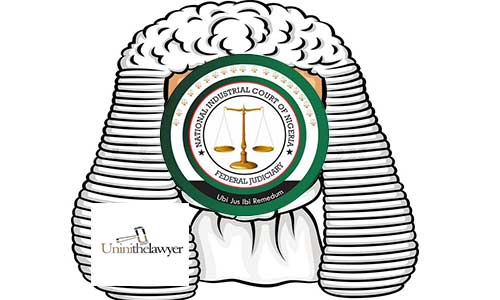The Presiding Judge, Owerri Judicial division of the National Industrial Court, His Lordship, Hon. Justice Ibrahim Galadima has declared the purported disengagement of Njoku Fidelia Ada and 460 other workers from the Public Service on the basis that they are non-indigenes of Abia State as a violation of the 1999 constitution and against the Public Service Rules.
The Court also declared that any executive or administrative order or law made in transferring Claimants without their consents on the basis of not being indigenes of Abia State as unlawful, null and void; ordered the State Civil Service Commission to reinstate them to their status as Civil Servants without prejudice to their entitlements and promotions which might have accrued to them during the period of their disengagement with the sum of Three Million Naira as cost of action.
From facts, the Claimants had submitted that they were variously employed into and served in the Public Service of the State of Abia, that due to the public outcry over a circular from the office of the Head of Service dated 25/8/2011 Backloading on Transfer of Non-Indigenes in the State Public Service to their respective States of Origin for absorption, that the government directed them to reapply for reabsorption which has yielded nothing to date.
In defence, the defendants filed objections that the suit is statute-barred having been instituted seven years after the cause of action arose; and further that the action of the State Government had constitutional backing that the State as one of its federating States which is independent and has powers to make its laws or policies for the purpose of good governance.
Learned counsel P. U. Ogubunka Esq enjoined the Court to find that the transfer policy with respect to non-indigenes in the Public Service of Abia State, could not have been unconstitutional since the policy transferred inclusive to be reabsorbed into their respective States’ Public Civil Service upon their disengagement.
Delivering Judgment, the Presiding Judge, Justice Ibrahim Galadima dismissed the objections for lacking merit.
“There is no denying that these surviving Claimants are all citizens of this Country bound by the Constitution of the Federal Republic of Nigeria. Some of them may have been born in the State of Abia, married to a spouse from that State, lived all their lives there and thus gained sufficient reasons to be deemed indigenes of the State or simply relocated from another State in order to achieve their dreams of a better life.
“It is clear that the word “non-indigenes” of a State is not employed by the Constitution to differentiate between a person who is and is not from any particular State, Local Government or Community.
“A non-indigene becomes anyone resident outside his or her area of patrilocal ancestry. In its also very common usage of the term, non-indigenes are further subdivided into strangers and settlers.
“Giving this country’s extraordinary cultural diversity, it is quite clear that certain divisions are held and maintained by its peoples to differentiate between persons not belonging to ethnic groups recognized within a politically recognized territory of a State as opposed to those who belong there. This is demeaning, I must state, and it is this differentiation that the Constitution abhors, and which is the basis for making all acts done by any authority which seem discriminatory, unconstitutional.
“In its purely legal sense, therefore, this Court finds that the use of the word “non-indigene” on any public document made by any Government or authority is indeed unconstitutional and violates the provisions of Section 42 of the Constitution as far as it portends to discriminate against certain persons not recognized or who do not belong to certain ethnic groups or place of origin within the State concerned, from being gainfully employed in that State or its public service, and I so declare.
“In the course of the proceedings, I reckon as well that there were moves made to ensure that the matter was settled amicably. It is encouraging to know that any reasonable Government will be able to look beyond parochial sentiments and encourage the unity of its people under her regardless of where they came from. The unity of this country is non-negotiable or optional after all.”







